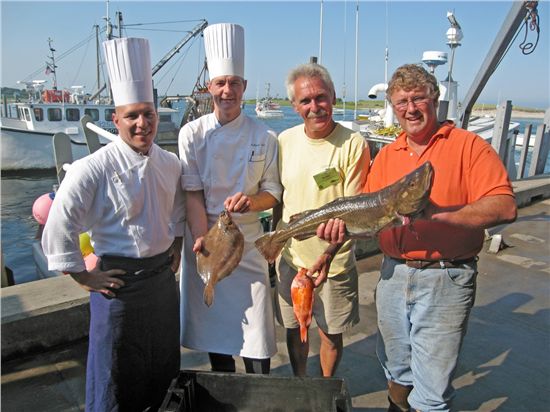Purpose
- Explores and develops market-based solutions.
Summary
New England’s groundfish fishery, which includes cod, haddock, pollock, & flounders, has been struggling to rebuild depleted fish populations for decades. Current management measures have proved ineffective. CCCHFA, in partnership with other Walker Foundation grantees, is leading a regional shift to market-based catch share management. The unexpected level of regional demand for catch share management has immobilized the regulators as they face resource limitations. The emerging political issues related to the timely implementation of catch shares require CCCHFA to be flexible in working with the regulators to develop solutions that will continue making progress. Discretionary support from the Walker Foundation has allowed CCCHFA to convene and mobilize stakeholders, program partners, Council members and staff, and government employees as needed to re-mobilize the adaptation of catch shares.
Description
03.07.08
CCCHFA's meetings with the Massachusetts State Secretary, the Executive Office of Energy and Environmental Affairs, the Department of Fish and Game, and the Northeast Seafood Coalition have resulted in the State publicly announcing their intent to develop plans for improved regulatory system to protect fishing industry and fish stocks. (see press release attachment) Plans are being drafted to utilize a portion of the State's disaster aid funds to create monitoring infrastructure for catch share management.
07.03.08
The State's Groundfish Initiative is moving forward with distributing the disaster aid funds to the fishing fleet; despite initial proposals that included some of the funds being set aside for monitoring, the final plan did not include funds for monitoring infrastructure. The State is continuing conversations with the federal fishery managers to improve the regulatory system.
The last six months have seen significant progress in communications with the National Marine Fisheries Service (NMFS), as well as a delay in implementation of catch shares.
1. NMFS has begun outlining their expectations for how catch shares will be implemented through the Council process.
2. The Council voted in April to delay implementation of catch shares in the groundfishery until 2010 (while the rest of the amendment is implemented in 2009) in order to provide adequate time for implementing monitoring systems.
3. The Council received preliminary results from the latest fisheries science turning all previous analysis on its head. Consequently, they voted in June to postpone the amendment process 4 months until the new science is reviewed and completely analyzed. This leaves a 4 month window in 2009 where NMFS will have to implement emergency management actions until the new regulations take effect.
Just this week we had an excellent facilitated meeting amongst several offices at NMFS, fishermen, potential sector managers, Environmental Defense, and Gulf of Maine Research Institute. The in depth and candid discussions lead to much consensus on how to move forward on developing dockside monitoring and at sea reporting standards. A future meeting will be planned to address at sea observers.

Fresh from Dock to Table. By replacing days at sea regulations, catch shares allow fishermen to better provide high-quality fresh fish. Pictured are chefs from the Chatham Bars Inn inspecting cod, flounder, and redfish fresh off the boat. Photos by Barrett Walker during Foundation site visit.
Purpose
The adaptation of catch shares in the groundfish fishery will bring market based fisheries management to New England. By allocating a dedicated share of the fishery’s total catch to communities, these innovative and economic incentive-based tools align sustainable fishing with the economic interest of fishermen. This form of adaptive management prevents overfishing, increases efficiency and safety, and allows fishermen to be responsible for the socio-economic decisions that are made on a local level.
Traditional management fosters “the tragedy of the commons,” and fish populations and fishing businesses continue to suffer as fishermen fish as hard as possible. Under catch shares programs, a community that exceeds their catch limit is penalized the following year. With dedicated catch shares, individual fishermen respond to the concept that overfishing is like removing principle from your bank account; they now have market-based incentives to end overfishing.
Scope
Demonstrating the effectiveness of catch share programs in New England will serve as a national model for reforming fisheries management. Maintaining healthy fisheries and fishing infrastructure is important to the U.S. economy. In 2006, U.S. consumers spent $69.5 billion for fishery products, and in producing and marketing these items, the commercial fishing industry contributed $35.1 billion in value added to the U.S. GNP.
On a more regional level, the implementation of catch shares in New England will end overfishing on groundfish. In its current depleted state, the fishery landings are worth $90 million. Once overfishing ends, it is estimated that the landings will be worth $300 million. The continuation of the groundfish fishery is essential in maintaining the infrastructure and global market relationships that supports groundfish, lobster, scallop, whiting, monkfish, and skate fisheries. New England’s 2006 fishery landings were valued at $954.6 million.
Amount Approved$10,000.00
on 2/20/2008
(Check sent: 2/25/2008)